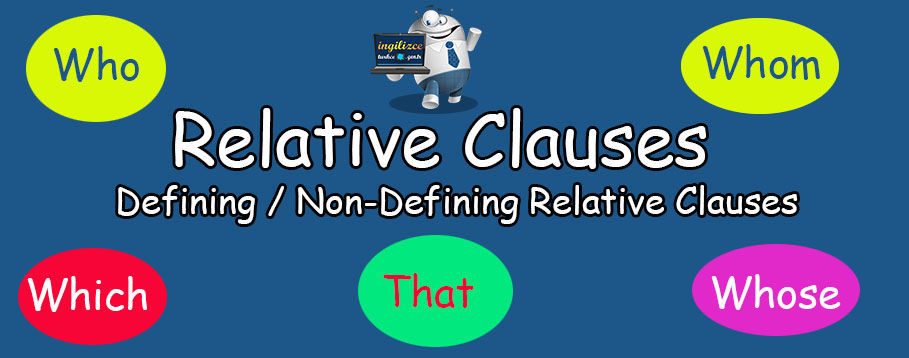Bu yapı, aynı zamanda Adjective Clauses (Sıfat Cümleleri) olarak da bilinir. İlgili iki cümleyi tek bir cümlede birleştirmek için kullanılırlar ve “defining” ile “non-defining” olmak üzere ikiye ayrılırlar. İki cümle birleştirilirken, fiilden veya yardımcı fiilden hemen önce Relative Pronouns kullanılır.
Relative Pronouns
Türkçe karşılığı “ilgi zamirleri”dir ve bunlar “who,” “which,” “that,” ve “whose” kelimeleridir. İlgili iki cümleyi tek bir cümle yapmak istediğimizde bu zamirlere ihtiyaç duyarız. Soru kelimeleriyle karıştırılmamalıdırlar çünkü cümleye soru anlamı katmazlar! Şayet tanımlanan insan ise “who,” nesne veya hayvan ise “which” kullanılır. Konuşma dilinde ise “who” veya “which” yerine daha çok “that” kullanılır. Sahiplik bildiren durumlarda ise “whose” kullanılır.
Defining Relative Clauses
a) Relative Pronoun As the Subject of the Clause (Cümlenin Öznesi olarak)
- Who (İnsanlarda), Which (Hayvan ve cansızlarda), That (İnsanlarda, hayvanlarda ve cansızlarda)
İlgi zamirleri, herhangi bir şey hakkında detaylı bilgi vermek istendiğinde kullanılırlar. Bir başka deyişle, “hangi” ya da “kim” sorusuna cevap verirler.
Ahmet is a lawyer and he has two children.
Ahmet bir avukattır ve iki çocuğu vardır.
Ahmet who has two children is a lawyer.
İki çocuğu olan Ahmet bir avukattır.
Yukarıdaki cümleden anlarız ki pek çok Ahmet arasından “iki çocuğu olan Ahmet” kastedilmiştir. İlk cümleyi aşağıdaki şekilde de yazabilmemiz mümkündür.
Ahmet who is a lawyer has two children.
Avukat olan Ahmet’in iki çocuğu vardır.
The garnener has one dog and two cats. He earns much money.
Bahçıvanın bir köpeği ve iki kedisi var. Çok para kazanıyor.
The gardener who earns much money has one dog and two cats.
Çok kazanan bahçivanın bir köğeği ve iki kedisi vardır.
The gardener who has one dog and two cats earns much money .
Bir köpeği ve iki kedisi olan bahçıvan çok para kazanır.
This is a race horse. It rus very fast.
Bu bir yarış atıdır. Çok hızlı koşar.
This is a race horse which runs very fast.
Bu çok hızlı koşan bir yarış atıdır.
The book has so many pages. I don’t know how to finish it.
Kitabın çok fazla sayfası var. Onu nasıl bitireceğimi bilmiyorum.
I don’t know how to finish the book which has so many pages.
Çok fazla sayfası olan kitabı nasıl bitireceğimi bilmiyorum.
This car is very expensive. My father bought it for me last month.
Bu araba çok pahalıdır. Geçen ay babam onu benim için satın aldı.
This car which my father bought for me last month is very expensive.
Babamın geçen ay benim için aldığı bu araba çok pahalıdır.
- Whose (İyelik sıfatları yerine – insanlarda, hayvanlarda ve cansızlarda)
İyelik sıfatı (my …., his…., her… their …. our … gibi) geçen iki cümleyi birleştirirken “whose” kullanılır. Hem insanlar hem de cansızlar ve hayvanlar için kullanılır.
The girl studies at Harvard University. Her family is very poor.
Kız, Harvard Üniversitesi’nde okuyor. Onun ailesi çok fakirdir.
The girl whose family is very poor studies at Harvard University.
Ailesi çok fakir olan kız Harvard Üniversitesi’nde okuyor.
Fark ettiğiniz üzere iyelik sıfatı yerine whose kullanılmıştır. Aşağıdaki örnekle birlikte daha iyi anlamış olacaksınız.
They are very clever students. Their exam results are always at highest grades.
Onlar çok zeki öğrencilerdir. Onların sınav sonuçları her zaman en yüksek derecededir.
They are very clever students whose exam results are always at highest grades.
Onlar sınav sonuçları her zaman en yüksek derecede olan zeki öğrencilerdir.
b) Relative Pronoun As the Object of the Clause (Cümlenin Nesnesi olarak)
Resmi ya da akademik yazılarda ise “who” yerine “whom” daha sık kullanılır.
The teachers in this course are great. We take lessons from them.
Bu kurstaki öğretmenler harika. Onlardan ders alıyoruz.
The teachers who we take lessons from in this course are great.
The teachers whom we take lessons from in this course are great. (Resmi kullanım)
The teachers that we take lessons from in this course are great. (Samimi kullanım)
Tanımlanan cümlede, tanımlanacak isim nesne durumunda ise relative pronouns (who, whom, which, that) kullanılmadan da aynı anlam verilebilir. Resmi ve konuşma dilinde bu kullanım daha yaygındır.
The teachers we take lessons from in this course are great.
Bu kursta ders aldığımız öğretmenler harika.
The man ran over the lady last week. She has still been in the intensive care unit at the hospital.
Adam geçen hafta bayana arabayla çarptı. O hala hastanede yoğun bakım ünitesinde.
The lady whom the man ran over last week has still been in the intensive care unit at the hospital.
The man who ran over the lady last week is still in the intensive care unit at the hospital.
The lady the man ran over last week has still been in the intensive care unit at the hospital.
Geçen hafta adamın arabayla çarptığı bayan hala hastanede yoğun bakım ünitesinde.
We cannot find the parcel. You sent it last week.
Paketi bulamıyoruz. Onu geçen hafta gönderdiniz.
We cannot find the parcel which you sent us last week.
We cannot find the parcel you sent us last week.
Geçen hafta gönderdiğiniz paketi bulamıyoruz.
c) Relative Pronoun As the Object of a Preposition (Edatın Nesnesi Olarak)
This is the computer about which I told you.
This is the computer which I told you about.
Bu sana hakkında bahsettiğim bilgisayardır.
The man whom I bought the car from was his relative.
Arabayı aldığım adam onun akrabasıydı.
Not: Who ve that kelimeleri edatlardan (in, on, at, from, about, vs) sonra kullanılmazlar.
The teachers from who we take lessons in this course are great.
The teachers from that we take lessons in this course are great.
Şayet iyelik sıfatı bir nesneyi tanımlıyorsa “whose” yerine “.…. of which” da kullanılabilir, fakat bu kullanım çok nadirdir.
This is the car the key of which you own.
This is the car whose key you own.
Bu anahtarına sahip arabadır.
Yine, özellikle sınavlarda, fiillerle birlikte kullanılan edatlar (in, on, at, from, about gibi) “whose” ilgi zamirinden önce gelir.
This is the lady. Ahmet goes out with her sister.
Bu bayandır. Ahmet onun kız kardeşiyle çıkıyor.
This is the lady with whose sister Ahmet goes out.
Bu Ahmet’in, kız kardeşiyle çıktığı bayandır.
Aşağıdaki şekilde de kullanabilirsiniz, fakat sınavlarda karşınıza genellikle yukarıdaki kullanım şekli ile çıkar.
This is the lady whose sister Ahmet goes out with.
d) As Relative Adverb (İlgi Zarfları Olarak)
- Where, When, Why
Where: Mekan belirtirken kullanılır.
We stayed in a very expensive hotel last year. There were many tourists there.
Geçen sene çok pahalı bir otelde kaldık. O’nda çok fazla turistler vardı.
We stayed in a very expensive hotel where there were many tourists last year.
Geçen sene çok fazla turistin olduğu çok pahalı bir otelde kaldık.
where yerine aynı anlama gelen in which de kullanabiliriz.
We stayed in a very expensive hotel in which there were many tourists last year..
When: Zaman belirtirken kullanılır.
Sunday is the day when we do not work in the company.
Pazar şirkette çalışmadığımız bir gündür.
Why: Neden belirtirken kullanılır.
The reason why I couldn’t attend the meeting yesterday was I was ill.
Dün toplantıya katılamama nedenim hasta olmamdı.
Non Defining Relative Clauses
Ekstra bilgi verilmek istendiğinde virgül ile birlikte kullanılırlar. Bu yapıda kesinlikle “that” kullanılmaz!
The childen didn’t take the exams. They failed.
Çocuklar sınava girmediler. Onlar başarısız oldular (kaldılar).
The childen, who didn’t take the exams, failed.
Sınava girmeyen çocuklar (öğrencilerin tamamı) başarısız oldular (kaldılar).
Yukarıdaki cümlede tüm öğrencilerin sınava girdiğini ve onların neden başarız olduklarını anlayabiliriz. Özellikle belirli çocuklar kastedilseydi o zaman arada virgül olmadan şu şekilde kullanılırdı.
The childen who didn’t take the exams failed.
Sınava girmeyen çocuklar (sadece girmeyenler) başarısız oldular (kaldılar).
Daha fazla örnekler aşağıdadır.
I live in Istanbul, the city which is very crowded.
Çok kalabalık bir şehir olan İstanbul’da yaşıyorum.
İstanbul zaten bir tane olduğu için virgül ile kullanılarak hakkında ekstra bilgi verilmiştir.
I have two brothers, who are very rich.
Çok zengin olan iki erkek kardeşim var.
Erkek kardeşler hakkında ekstra bilgi verilmiştir. Şayet virgül kullanılmasaydı erkek kardeşler arasında çok zengin olan iki tanesi kastedilmiş olurdu.
Relative Clauses Örnekleri
- Who:
- The teacher who taught us mathematics is retiring this year..
- Bize matematik öğreten öğretmen bu yıl emekli oluyor.
- Which:
- The book which I borrowed from the library was very interesting..
- Kütüphaneden ödünç aldığım kitap çok ilginçti.
- That:
- The cake that she baked was delicious..
- Onun pişirdiği pasta çok lezzetliydi.
- Whose:
- The student whose bike was stolen is very upset..
- Bisikleti çalınan öğrenci çok üzgün.
- Of which:
- The house, the roof of which was damaged in the storm, is being repaired..
- Çatısı fırtınada hasar gören ev tamir ediliyor.
- About which:
- The article about which we talked yesterday was published today.
- Dün hakkında konuştuğumuz makale bugün yayımlandı.
- For whom:
- The doctor for whom I work is very kind..
- Çalıştığım doktor çok nazik.
- Where:
- The city where I was born is famous for its beautiful beaches.. [/sayit]
- Doğduğum şehir güzel plajlarıyla ünlüdür.
- When:
- The year when we first met was unforgettable..
- İlk tanıştığımız yıl unutulmazdı.
- Why:
- The reason why she left early was because she had an appointment..
- Erken ayrılmasının sebebi bir randevusu olmasıydı.
Relative Clauses Hikaye
Tüm bu kullanımları içeren bir hikayeyi sizler için hazırladım, aşağıda bulabilirsiniz.
In a small town, there was a teacher who everyone loved. She lived in a house which had a garden full of colorful flowers. Every morning, she walked to the school that was a few blocks away.
One day, a new student whose name was Emily joined her class. Emily’s father, who had recently moved to the town for work, bought her a bicycle whose wheels were painted bright red.
The town, where they lived, had an annual festival which everyone looked forward to. One summer, a storm which was very strong hit the town and damaged many houses, including the teacher’s house whose roof was destroyed.
Despite the damage, the teacher who always smiled continued to teach. Emily, who admired her teacher, grew up to become a doctor who remembered the lessons of kindness. She moved to a big city which was far from her hometown but kept in touch with her teacher through letters that were filled with gratitude and memories.
The festival was the reason why the town was so lively. The day when the storm hit was unforgettable. The teacher, for whom everyone had great respect, continued to inspire her students.
Şimdi sıra geldi aşağıdaki soruları cevaplamaya 🙂
- Who was the teacher who everyone loved?
- What was special about the house which the teacher lived in?
- Where was the school that the teacher walked to every morning?
- Who was the new student whose name was Emily?
- Who was the person who recently moved to the town for work?
- What was unique about the bicycle whose wheels were painted bright red?
- What was the annual event which everyone looked forward to?
- What happened during the storm which hit the town one summer?
- Whose house was the one whose roof was destroyed?
- Who was the person who admired her teacher and became a doctor?
- What was the reason why the town was so lively?
- When was the day when the storm hit?
- For whom did everyone have great respect?
Alıştırmalar
Konuyu tam anlamıyla öğrendiğinizden emin olmak için aşağıdaki testi çözmeyi deneyiniz.
Relative Clauses Exercises
Not: Bu sayfaya daha hızlı ulaşabilmek için arama motoruna örneğin Google’a “relative clauses ingilizceturkce.gen.tr” olarak yazıp aratabilirsiniz.


Gerçekten çok güzel bir konu anlatımı olmuş hiç soru işareti kalmadı kafamda ve ayrıca sonda verilmiş olan hikaye,test ve sorularda inanılmaz güzel olmuş genelde bu tür şeyleri arardım fakat bulamazdim burası çok iyi oldu ellerinize sağlık
Detaylarıyla anlaşılır bir şekilde açıklamışsınız, teşekkür ederiz.
Çok güzel anlatmışsınız, teşekkürler.